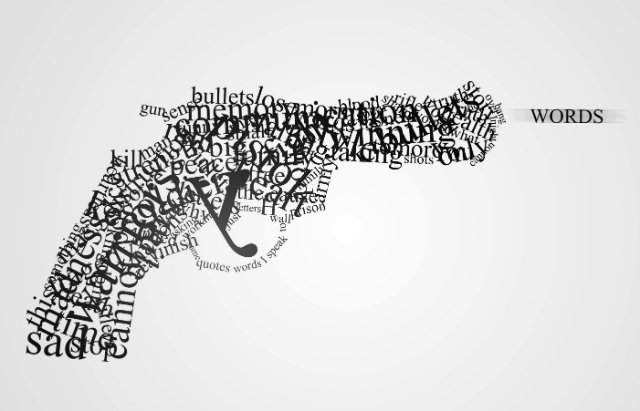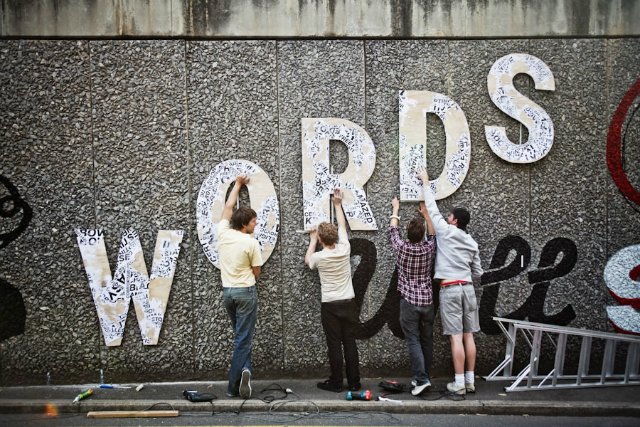As a child, I was taught a nursery rhyme, which said; sticks and stones will break my bones; but names will never hurt me. I had a bit of a problem with that rhyme as a child, and I still have a bit of an issue over it today, the difference is now that I'm an adult, I can articulate better what I feel is incorrect about this harmless little playground haiku.
Ultimately the message behind the sticks and stones song, is meant to convey that the hurt felt from name calling, is no where near as bad as being physically hurt. It could also perhaps be argued, that there is a more oblique message hidden within the folds of the tune. A message of; you can only control your reactions to people, and not the people themselves, so focus on that.
Maybe so, but that doesn't detract away from the fact that names do hurt, and the pain they cause can have an effect long after the cuts and grazes, inflicted by sticks and stones have healed.
Word Power
Words are all we have at our means to convey complex emotions and ideas. Only with words can we properly articulate our future plans. All human meaning, from philosophy to theology, from art to science, the majesties of knowledge that are wrapped up in all these ideologies, are encoded in the words that enshrine them.
Behold, it is the East, and Juliette is the Sun!
~ Romeo
As we read the words of Shakespeare, we do not envisage a hot, molten ball of radioactive gas hovering on a balcony. Rather we are instantly, and emotionally pulled to the feeling we are given when watching the sun rise over the horizon and set the clouds ablaze, fiery pinks, set on a golden glowing sky. We understand at once the love Romeo has for Juliette has he beholds the beauty he perceives to be more radiant than a thousand sunrises.
Romeo's plea with us to behold, let's us understand the moment his breath is taken away as he looks at his love, we associate that with our own heartstopping moments, over past loves.
In just ten simple words, we are told a story, which we can instantly encapsulate, and at once understand and relate to. This one sentence, reminds us that the power of words is not to be scoffed at; loves are won and lost, lives are changed and empires are razed by the potency of words.
If the pen is mightier than the sword, then the words it wields have more power than all the weapons of mankind brought to bear.
~ Cryptogee
The Emissaries Of Emotion
The original unkown composer of the Sticks and Stones nursery rhyme, showed in their lyrics, that perhaps they weren't fully aware that words not only display emotion, they convey them as well.
So the effect that somebody using angry words directed at you, is that you know they are angry, and their words have left you in a different emotional state, than before you heard the words. This is the case no matter who is speaking the words, or in what context, something we can prove right now.
As you read this, I want you to take a moment, and just in your head, say the following things to yourself, giving yourself a few seconds on each one before you move on.
Wow! I'm feeling great, I am so happy right now!
Oh man, I feel like I'm coming down with something, I am going to get ill.
I am feeling pretty sad right now.
Actually, I'm an amazing human being! Life is worth living, especially as I'm reading @cryptogee...
Joking!
Seriously though, do the experiment again, and this time monitor your facial expressions as you read the words; also take notice of your muscle tension and your overall internal feeling.
What you should find is that as you read the first positive statement, a partial, or even complete smile has emerged on your face. You will feel generally relaxed, and internally healthy, if you really meditate on it, you might find the room seems a bit brighter, and colours more vivid.
Conversly the second and third statements will cause your mouth to turn downwards, and perhaps the beginnings of a frown will appear between your eyebrows.
Hopefully the last statement will make you smile again, and want to read on!
We can really test how words and emotions are linked in our brains by doing an incongruency test; ok so indulge me once more and do me a favour; as you're reading this, I want you to crack a huge smile on your face, a big cheesy grin, like all the wonderful things at once have come home to roost, and you're simply happy.
Now, while smiling, say to yourself; I'm really angry right now!
Now return your lovely face to a neutral position, and clear your mind by thinking of your best friend's first pet. OK, so this time, start frowning and scowling and thinking of a politician or public figure who really annoys you.
Now while frowning and scowling, say to yourself; I am so incredibly happy right now!
OK, experiment over; what you should have felt, is that your smile kind of turned into a grimace, when reading the first statement; and your scowl turned into a grin, while reading the second statement. This is because your brain associates, a certain set of feelings and responses to trigger words like, angry and happy. Some of these responses include your facial expressions, so when you say you are happy when you are angry or sad, your brain simply tries to match your state with the word.
Powerful stuff eh?
The Origin Of Words
Actions
The emminent, neuroscientist, V.S. Ramachandran, who has been referred to as; "the Marco Polo of brain science", sets out an enthralling tale of evolutionary speech, in his best selling book; The Tell Tale Brain.
In his entire chapter dedicated to speech, Ramachandran puts forward his hypotheses on the formation of language in the human animal.
He alerts us to the fact that phrases like; come here, spoken in most languages require the tongue to flick upwards in a similar, come here gesture, that you might do with your hands. Ramachandran also points out that words like; big, large, enormous, small, little and tiny, all require the mouth to either be big or small. In fact if you try and say enormous, while keeping your mouth small, it feels pretty strange, equally if you try and open your mouth wide as you say the word; small.
Interestingly though, because tiny, is actually a word which conveys exaggaration, this word doesn't feel strange when saying it with a wide mouth, and this can be emphasised by saying; "really tiny!"
Ramachandran tells us that the reason for this, is that these are base words that were built up as our speech areas of the brain were developing. They developed right along side the motor cortex, and so our words and gestures co-evolved, with the part of the brain controlling our tongues, residing right next to the part that controls our fingers; indicating they may have been originally exapted from this area.
Emotions
Look at the picture below; tell me, which one is bouba and which is kiki?
I'm guessing that you; along with 98% of people ever shown this image, regardless of what language they speak, that you said the one on the right was bouba and the one on the left kiki.
If you didn't, then I guess you're with the 2%, which means you're either all special, or you're all just trying to be jerks and annoy the experimenters!
In all seriousness, I am sure there are legitimate reasons why only 2% can't see it, however what it does show with such overwhelming clarity, is that the human brain is perfectly adapted to attach a random word to a feeling.
In the same way you see bouba, when you look at the image on the right, if I had asked you to describe the word. Then perhaps you may have moved your hands in a soft curving, circular way. Whilst describing kiki would have had you making karate chop, type movement.
The reason you attribute those names to those shapes, is because the words make you feel something; and the shape gives you a feeling that you can easily translate to a word. This is essentially emotion boiled down to its raw essence.
Bouba and kiki are nonsensical words; imagine the strength of emotion that words with meaning, stir up inside us; will those feelings be less or more intense than the Bouba kiki effect?
Talk Yourself Up
The point of this article, is to get you to realise that the words you speak, to yourself; as well as to others, have an emotional effect on you.
The region of your brain, that is responsible for processing sound, is quite separate from the areas that are responsible for speech. Therefore, saying negative things about yourself, is received in your brain in exactly the same way, as when someone else is saying bad things about you.
Your words have the power to shape your emotions, meaning they will shape your mood and general outlook on life.
Fill your life with positive words, which in turn will fill you with positive feelings, from which you, and those around you, will benefit greatly.
From time to time, we are all struck by misfortune and sometimes tragedy, on those occasions it is usually the words of others that give us strength and courage. However, my challenge to you; is to go around for the next 30 days, saying that the glass is half full, as opposed to half empty. Along with this, monitor how you speak to yourself, do not use negative words when you do something wrong, and always congratulate yourself on a job well done.
After the 30 days are up, you will realise a change in yourself, especially if you are the sort of person to say "you idiot" to yourself when you do something wrong.
You will be brighter, more positive, and the people around you will feed off that, and that in turn will nourish you, and encourage you to carry on using the power of words, for good!
Till Next Time
Cryptogee
image source: words
image source: word gun
image source: smiley
image source: sticks and stones
image source: boubakiki





A very beautiful article, thank you for your sharing and dedication to quality. Namaste :)
Downvoting a post can decrease pending rewards and make it less visible. Common reasons:
Submit
Thanks Eric :-)
Cg
Downvoting a post can decrease pending rewards and make it less visible. Common reasons:
Submit
This post has been linked to from another place on Steem.
Learn more about linkback bot v0.4. Upvote if you want the bot to continue posting linkbacks for your posts. Flag if otherwise.
Built by @ontofractal
Downvoting a post can decrease pending rewards and make it less visible. Common reasons:
Submit
@cryptogee
upvoted 100%!
I totally agree, one wise man once said; learn to hold your tongue for what you speak could become actions and could have a huge impact in your life in order to do that attach your tongue in your heart and hold your heart as well. And he added sometimes one gets jealous of another person say a partner or a friend, what normally follows is the "outing" of that jealousy in word which could accelerate to first threatening then hurting the other person which could break relationships no matter how tight the bond is.
Well said, I couldn't agree more
Downvoting a post can decrease pending rewards and make it less visible. Common reasons:
Submit
Indeed, we all need to be kinder to ourselves :-)
Cg
Downvoting a post can decrease pending rewards and make it less visible. Common reasons:
Submit
The power of our words can inspire or destroy, how magical!
Downvoting a post can decrease pending rewards and make it less visible. Common reasons:
Submit
Indeed they can; thank you for your comment.
Cg
Downvoting a post can decrease pending rewards and make it less visible. Common reasons:
Submit
Indeed they can; thank you for your comment.
Cg
Downvoting a post can decrease pending rewards and make it less visible. Common reasons:
Submit
I prefer the words that build, not those who destroy
Downvoting a post can decrease pending rewards and make it less visible. Common reasons:
Submit
A superb article @cryptogee. We create our environment with our words. Thank you for sharing this post with us.
Downvoting a post can decrease pending rewards and make it less visible. Common reasons:
Submit
Excellent post. Truer words were never spoken.
Downvoting a post can decrease pending rewards and make it less visible. Common reasons:
Submit
I enjoyed this post very much. Very beautiful and powerful
statementswords!Downvoting a post can decrease pending rewards and make it less visible. Common reasons:
Submit